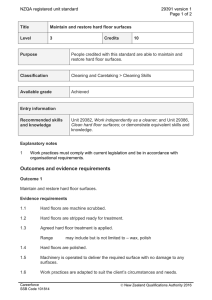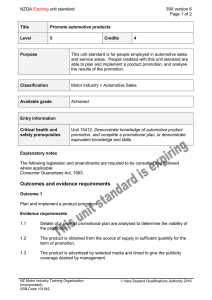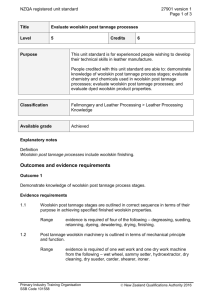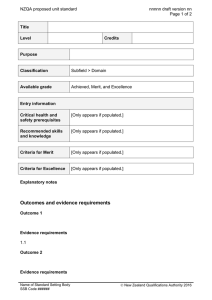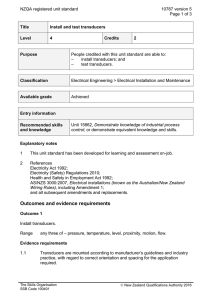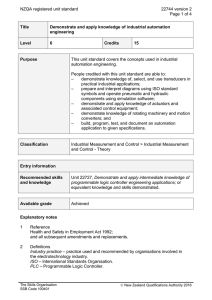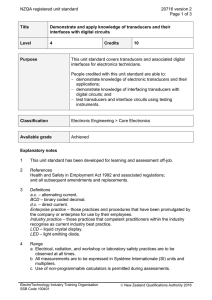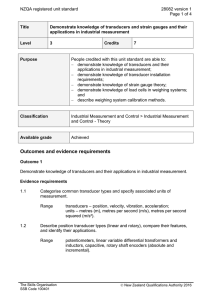NZQA registered unit standard 15862 version 4 Page 1 of 3
advertisement
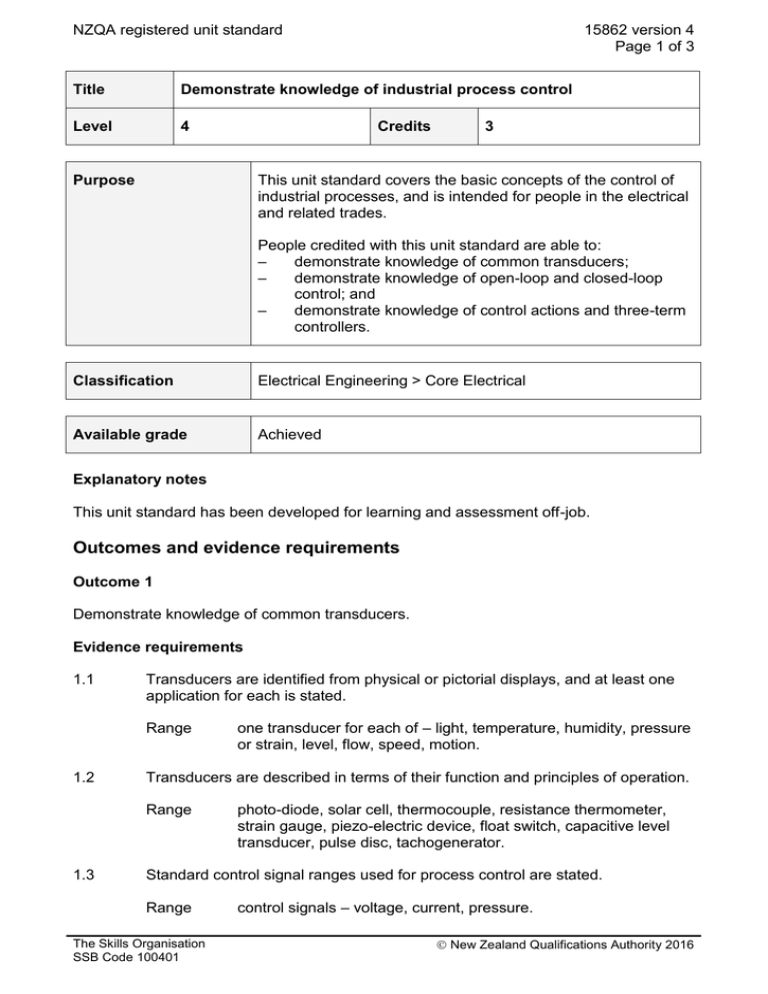
NZQA registered unit standard 15862 version 4 Page 1 of 3 Title Demonstrate knowledge of industrial process control Level 4 Credits Purpose 3 This unit standard covers the basic concepts of the control of industrial processes, and is intended for people in the electrical and related trades. People credited with this unit standard are able to: – demonstrate knowledge of common transducers; – demonstrate knowledge of open-loop and closed-loop control; and – demonstrate knowledge of control actions and three-term controllers. Classification Electrical Engineering > Core Electrical Available grade Achieved Explanatory notes This unit standard has been developed for learning and assessment off-job. Outcomes and evidence requirements Outcome 1 Demonstrate knowledge of common transducers. Evidence requirements 1.1 Transducers are identified from physical or pictorial displays, and at least one application for each is stated. Range 1.2 Transducers are described in terms of their function and principles of operation. Range 1.3 one transducer for each of – light, temperature, humidity, pressure or strain, level, flow, speed, motion. photo-diode, solar cell, thermocouple, resistance thermometer, strain gauge, piezo-electric device, float switch, capacitive level transducer, pulse disc, tachogenerator. Standard control signal ranges used for process control are stated. Range The Skills Organisation SSB Code 100401 control signals – voltage, current, pressure. New Zealand Qualifications Authority 2016 NZQA registered unit standard 15862 version 4 Page 2 of 3 Outcome 2 Demonstrate knowledge of open-loop and closed-loop control. Evidence requirements 2.1 Control terms are defined in accordance with industry practice. Range comparator, set point value, feedback, deviation, gain, final control element, controlled variable, measuring element, proportional offset. 2.2 Open-loop control is described with the aid of a block diagram. 2.3 Closed-loop control is described with the aid of a block diagram. 2.4 The features of closed-loop control systems are described in terms of measuring, comparing, and adjusting. 2.5 Advantages of closed-loop control over open-loop control are stated for common control processes. Range control processes – level, temperature, motor speed. Outcome 3 Demonstrate knowledge of control actions and three-term controllers. Evidence requirements 3.1 Objectives of good control systems are explained. Range 3.2 Types of control action are described with the aid of process response diagrams. Range 3.3 low offset, fast response, stability. on-off, proportional, derivative, integral. Operation of the three-term controller is described using a block diagram. Range buffer amplifier, comparator, proportional amplifier, integral amplifier, derivative amplifier. Replacement information The Skills Organisation SSB Code 100401 This unit standard replaced unit standard 1711 and unit standard 2026. New Zealand Qualifications Authority 2016 NZQA registered unit standard Planned review date 15862 version 4 Page 3 of 3 31 December 2014 Status information and last date for assessment for superseded versions Process Version Date Last Date for Assessment Registration 1 10 February 1999 31 December 2013 Review 2 26 May 2005 N/A Rollover and Revision 3 15 March 2012 N/A Revision 4 15 January 2014 N/A Consent and Moderation Requirements (CMR) reference 0003 This CMR can be accessed at http://www.nzqa.govt.nz/framework/search/index.do. Please note Providers must be granted consent to assess against standards (accredited) by NZQA, before they can report credits from assessment against unit standards or deliver courses of study leading to that assessment. Industry Training Organisations must be granted consent to assess against standards by NZQA before they can register credits from assessment against unit standards. Providers and Industry Training Organisations, which have been granted consent and which are assessing against unit standards must engage with the moderation system that applies to those standards. Requirements for consent to assess and an outline of the moderation system that applies to this standard are outlined in the Consent and Moderation Requirements (CMR). The CMR also includes useful information about special requirements for organisations wishing to develop education and training programmes, such as minimum qualifications for tutors and assessors, and special resource requirements. Comments on this unit standard Please contact The Skills Organisation reviewcomments@skills.org.nz if you wish to suggest changes to the content of this unit standard. The Skills Organisation SSB Code 100401 New Zealand Qualifications Authority 2016
